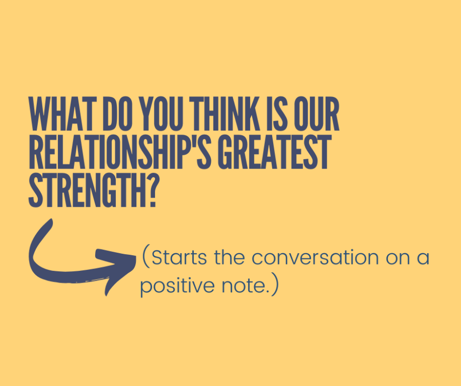How to Express Romantic Love: Effective and Heartfelt Gestures
All the world celebrates romantic love, and people from all walks of life look for ordinary moments and extraordinary ones to express love to their...
6 min read
![]() Williamsburg Therapy Group
:
Jan 31, 2023 10:42:38 AM
Williamsburg Therapy Group
:
Jan 31, 2023 10:42:38 AM

Whether you met last night or you're about to celebrate your 50th anniversary, knowing more about your partner can be a great way to improve your relationship.
As experts in the marriage counseling field, we've compiled eight of the best questions you can discuss with your partner in order to deepen your knowledge of what makes them - and the relationship - tick.
Let's explore these questions and the reasons you'll want to ask them:
What seems to be the greatest strength in our relationship?
What about the greatest weakness?
What is one behavior you think I can improve on?
If you could do anything with your life, money being no object, what would it be?
Is there anything about your life or childhood that you haven't talked about with me but want to?
What do you envision our relationship being like one year from now? 5 years? 20 years?
What can I do to improve our sex life?
What can I do when it comes to improving communication in our relationship?
Before we begin, it's important to note that these at-home couple's questions are not a replacement for true marriage counseling or couple's therapy.
In marriage counseling sessions, your therapist is trained and licensed to help you improve communication, strengthen bonds, and work through conflict in a healthy way.
Nearly every couple could benefit from some form of couples therapy, so we definitely recommend trying it if you feel there is something in your relationship that could be improved.
The following questions can be great for getting to know your partner and what they need and want in order to have a happy marriage or relationship.
However, if you start to identify problematic areas or are having trouble discussing these questions in a civil and healthy manner, a marriage therapist may be able to help you understand why and work to improve.
With that disclaimer out of the way, let's get started.
It's best to start by identifying positive feelings and behaviors. This sets the tone of the discussion as positive and constructive rather than critical and negative.
Some strengths you may see in your relationship include:
Take a few moments to talk about what makes your relationship great.

After you talk about what you as a couple do right, take some time to address potential areas for improvement.
Don't point out anyone's behavior specifically yet. This question is about laying a conversational foundation for a constructive exploration of the relationship.
Keep it broad by mentioning things like:
After you put the relationship in a context of improvement with a backdrop of what's already going well, you can start to address individual behaviors.
By the way, if this question started an argument, we recommend booking a couples therapy session to make sure things stay constructive.
Now it's time to start looking at individual behaviors and how they affect the relationship.
Asking what you can improve on gives your partner the opportunity to be honest and make suggestions. It also demonstrates openness to communication and change.
Remember that the point of this exercise is to build up, not tear down. Be receptive and attentive to feedback, ask clarifying questions, and try not to become upset. Your partner is participating in this in order to help the relationship and make both of you happier. It's not about pointing out your flaws, it's about exploring options for a happier relationship.
The Gottman Method is one of the most well-researched and effective couples therapy techniques ever created. Among many other things, the Gottman Method emphasizes the importance of shared life goals and philosophies in long-term, happy relationships.
Of course, the answer to this question is purely hypothetical. Money is definitely an object in most cases. But this question can help each partner determine what is truly important to the other.
Some examples of ultimate life goals to get the conversation going include:
Have fun talking about your dream life, but make sure you're making mental notes about what your partner is saying. Their answers could give you insight into how you can make them happier.
If they would choose to explore the world, for example, you might say they highly value having new experiences, meeting new people, and being surprised.
For their next birthday, then, you might try surprising them with a weekend road trip to a place neither of you has been before.
Much of how we behave in our adult lives can be traced to events from our childhood. Learning more about your partner's past might give you context for why they do things a certain way or have difficulties with an area of the relationship.
A quick note: don't push too hard on this question. Most of us have things about our lives that we don't necessarily feel ready to share, and that's okay. The last thing you want to do is pressure your partner into divulging something that should probably be discussed with a licensed therapist first.
If they want to discuss something and are willing to volunteer it, listen carefully and try to interpret how certain past events might be affecting the relationship now. Some common responses to this question are:
If you feel as though something from your or your partner's past may be affecting your relationship, we recommend speaking with a couples therapist to make sure you can work toward healing safely and effectively.

Along the same vein as our hypothetical money-no-object question, this one can help you define in more practical terms what the goal of the relationship is.
It's common for there to be differences in each partner's answer, so don't let that send you into a panic. The reality of long-term relationships is that there will be milestones, compromises, and changes in goals over time. Nothing you discuss here is set in stone.
Some sub-questions you can ask during this part of your discussion include:
It's totally okay to not be on the same page or have all the same values as your partner. In fact, disagreeing on some of these things can be very healthy. Again, if you find it difficult to discuss this question or if your future plans appear to be in conflict, a couples therapist can help you work through it.
Sex is often closely linked with feelings and intimacy (with the exception of those in asexual relationships.)
Improving your relationship in general can be hugely beneficial to your sex life, but the reverse can also be true. A more fulfilling sexual relationship can make a healthy couple even stronger.
Some points of discussion on sex to get the wheels turning include:
Being honest about sex can feel awkward even between long-time partners, so this question can be a tough one. Try to keep things judgment-free and communicative. If you get stuck, talking to a marriage counselor can help.
This is a very actionable question. It gives both partners a chance to make requests or recommendations about the way you communicate with each other.
Often, many problems in a given relationship actually stem from the same communication failure.
For example, let's say that you and your partner consistently argue about who needs to walk the dog on Tuesday, what your weekend yard work plans are, and why there are dirty clothes all over the bedroom.
While you're fighting about many different things (the dog, the yard, and clothes), there may just be one missing line of communication that could solve all of them at the same time. Maybe all you need to do is have a 15-minute discussion every Monday to divide up chore responsibilities.
Pretty much every couple could use improvement on communication, but so few take the time to simply ask what they can do better.
These questions can be a great way to gain some insight on the relationship that was previously buried. You'll probably learn some stuff about yourself as well!
If you find that these questions are hard to answer or that talking about them causes conflict, book a couples therapy appointment to speak with a trained professional. They'll use evidence-based therapeutic methods to help you make progress.
Williamsburg Therapy Group offers couples therapy in Austin and Brooklyn. Give us a call to get matched with one of your doctoral-level marriage counselors. Feeling better may be closer than you think.

All the world celebrates romantic love, and people from all walks of life look for ordinary moments and extraordinary ones to express love to their...

What is relationship burnout or relationship fatigue? Many of us have heard of burnout, but we often connect it to professional life and the problems...

In today's digital age, so many of us are locked into our mobile devices each and every day, which can have a negative impact on our mental...